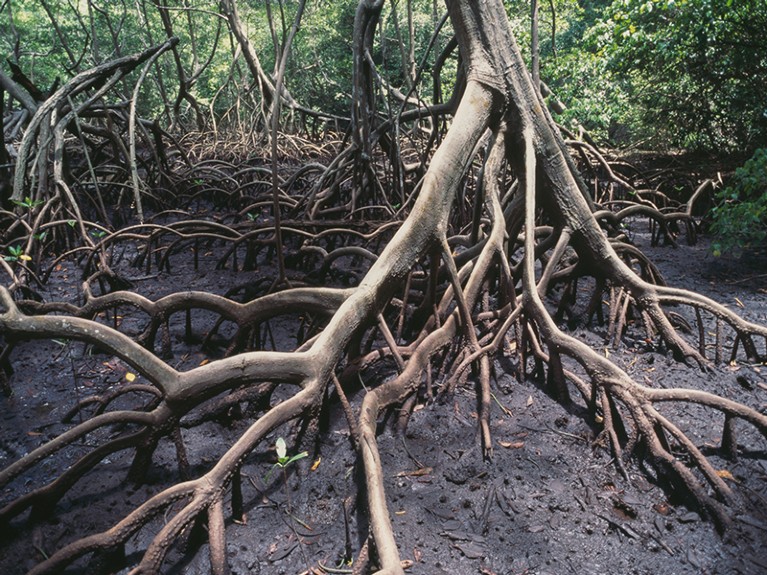
Research on ecologically valuable mangroves is one of many fields where not enough local and regional experts are included.Credit: DEA/V. Giannella/Getty
Exploitative research practices, sadly, come in all shapes and sizes. ‘Helicopter research’ occurs when researchers from high-income settings, or who are otherwise privileged, conduct studies in lower-income settings or with groups who are historically marginalized, with little or no involvement from those communities or local researchers in the conceptualization, design, conduct or publication of the research. ‘Ethics dumping’ occurs when similarly privileged researchers export unethical or unpalatable experiments and studies to lower-income or less-privileged settings with different ethical standards or less oversight.
Such behaviours are wrong. They are also bad for research, which is denied crucial expertise and context. But for centuries, exploitative practices were, unfortunately, simply how researchers from around the world conducted studies in the global south. And even as the south’s capacity to do its own research has grown, elements of these practices continue.
That is why Nature Portfolio is introducing a new approach to improving inclusion and ethics in its journals (including Nature and all Nature Portfolio journals). The move comes as other journals grapple with similar issues and as the seventh World Conference on Research Integrity, held in Cape Town, South Africa, prepares to publish a statement urging action on them.
There are plenty of examples of the persistent imbalance in research across multiple fields. One analysis1 of a sample of studies conducted in Africa on a range of infectious diseases found that less than half had an African first or last author. Another report2 showed that two-thirds of high-impact geoscience articles on Africa had no African authors.
Even in development research, for which the focus is overwhelmingly on challenges facing the global south, authors from the global north wrote nearly three-quarters of papers published in the world’s top 20 development journals between 1990 and 20193.
Researchers from global south under-represented in development research
In 2018, researchers in Africa published guidelines on how samples and data from the global south can be guarded from exploitation. But changing centuries of bad practice requires a joint effort across the research ecosystem.
Nature’s latest steps to improve inclusion and ethics are guided by the Global Code of Conduct for Research in Resource-Poor Settings, developed by TRUST — a European Union-funded project on research ethics — and by the San Code of Research Ethics, developed by the San Indigenous people in southern Africa.
In the new guidance, Nature will be encouraging its journals’ authors, editors and reviewers to consider the Global Code when developing, conducting, reviewing and communicating research. We also want to create opportunities for authors to be transparent about inclusion and ethics. So we are urging them, through Nature’s editorial-policy checklist, to provide an optional disclosure statement on inclusion and ethics that can be shared with reviewers and published in the final paper. Editors can, at their discretion, ask authors to provide a statement.
To guide authors in writing such a statement — and to help minimize the possibility of helicopter science and ethics dumping — we have developed questions drawn from key aspects of the Global Code. These include: did the research design and execution include local scientists? Is the research locally relevant? Are there plans to share the benefits of the research? Where legislation on animal welfare or environmental protection was less stringent in the local setting than where the researchers were based, was the study undertaken to the higher standards?
We are encouraging authors to cite relevant local and regional research, to improve the quality of their citations and to promote citational justice. A study4 published on 30 May finds that scientific papers from researchers in a few countries, including the United States, China and the United Kingdom, are more likely to be cited than those on similar subjects from researchers elsewhere.
Nature’s new approach also aims to ensure that peer review includes representation from relevant regions and communities.
We don’t yet have all the answers, and there are nuances that we will need to grapple with. For example, it might be important to seek out local contributors when researchers are using publicly available or secondary data that they were not involved in gathering5, to add important cultural context or an appreciation of local impacts.
Nature is not alone in tackling these issues. Last year, the open-access publisher PLOS announced a policy intended to combat helicopter research, and a group of researchers — including the editors of the journals Anesthesia and BMJ Global Health — proposed6 that journals ask authors of studies conducted in low- and middle-income countries to supply statements describing how equity was promoted in their work. The statement from this year’s World Conference on Research Integrity is expected to call out inequity and unfair practices in research collaborations as a matter of research integrity.
The time is now for all stakeholders — funders, institutions, publishers and researchers — to consider how we can work together to dismantle systemic legacies of exclusion.
 Researchers from global south under-represented in development research
Researchers from global south under-represented in development research
 The rise of citational justice: how scholars are making references fairer
The rise of citational justice: how scholars are making references fairer








